MIL OSI Translation. Government of the Republic of France statements from English to French – Published August 16, 2018
Section: International, development and francophonie
The President of the Republic met this morning by telephone with his Turkish counterpart, Recep Tayyip Erdogan.
The discussion focused on the economic and financial situation in Turkey. The President of the Republic recalled the strong economic and trade links between the European Union and Turkey and underlined his commitment to a stable and prosperous Turkey. He assured President Erdogan of France's support in this regard.
The French President also welcomed the announcement of the release of Taner Kiliç, Turkish director of Amnesty International, as well as the announcement of the Greek soldiers detained in Turkey.
The interview focused at length on Syria. The President of the Republic expressed his concern about the situation in Idlib and the humanitarian, security and political consequences that would result from a military offensive by the regime in this region.
In this regard, he underscored the importance of Turkey's role and exchanges with all the countries concerned, including Russia and the United States, to avoid escalation, and called for strengthened bilateral exchanges between France and Turkey in the coming weeks.
The two Presidents agreed on the need to accelerate joint efforts for a credible and inclusive political process, the only way to guarantee the stability and unity of Syria and to allow, in due course, a secure return. , dignified and voluntary refugees, under the conditions of the United Nations High Commissioner for Refugees (UNHCR). In this respect, France and Turkey will work together to bring together the work of the Small Group and the Astana format.
EDITOR'S NOTE: This article is a translation. Please accept our apologies should the grammar and / or sentence structure not be perfect.



